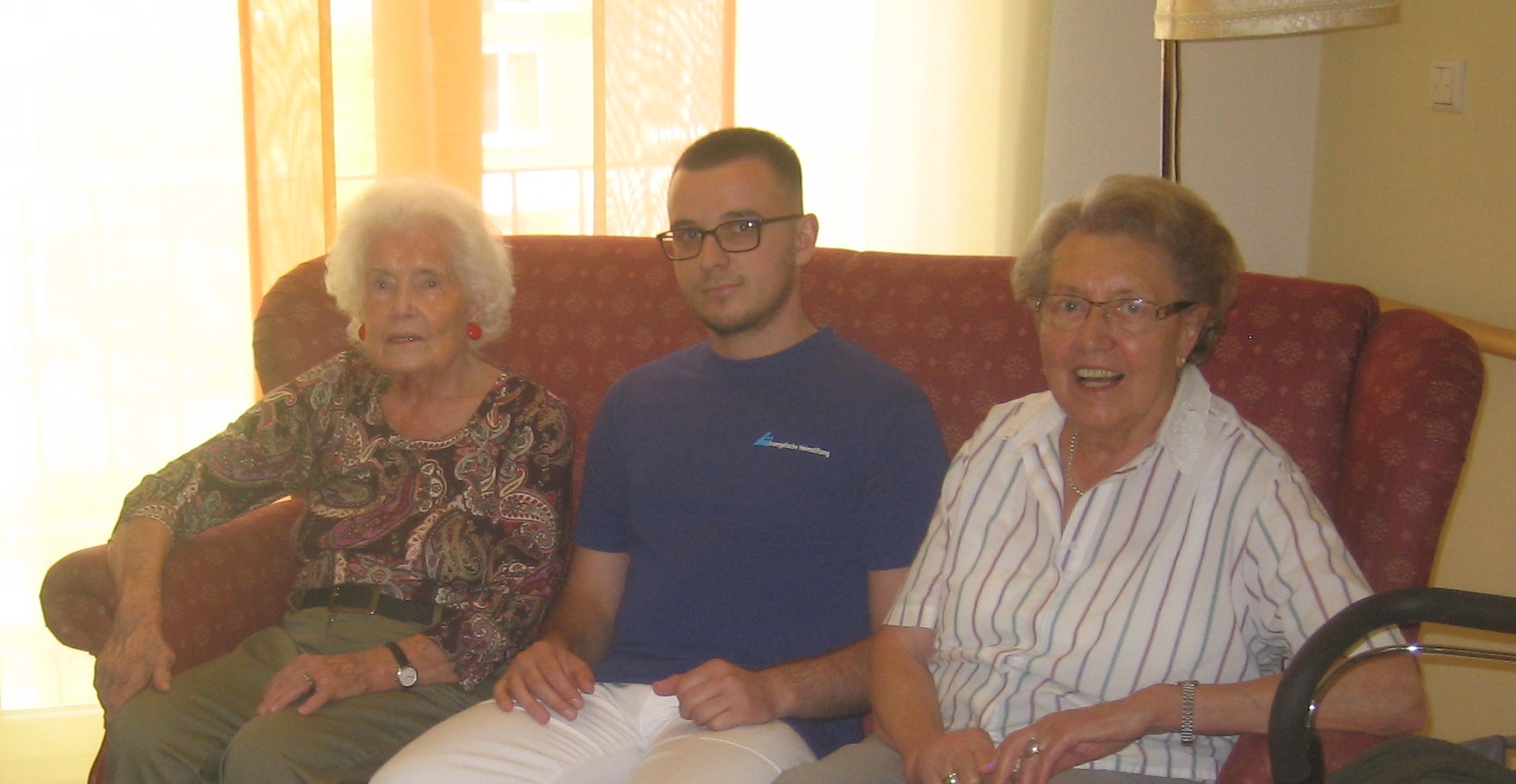Mehrere Dutzend junge Menschen aus dem Kosovo machen in der Evangelischen Heimstiftung ihre Ausbildung zum Altenpfleger. Das Projekt der Diakonie Württemberg, im Rahmen dessen sie nach Deutschland kommen, geht einschließlich Vorbereitungsjahr über vier Jahre. Wenn alle bürokratischen Hürden geschafft sind und die sprachliche Entwicklung erfolgreich war, beginnt die Ausbildung zusammen mit deutschen Azubis. Die ersten Tage sind für alle Beteiligten ereignisreich. Es wird gelernt, wie öffentliche Verkehrsmittel funktionieren und wie man ein Bankkonto eröffnet. Die Projektteilnehmer sind mit komplizierten Wörtern wie Steuer-Identifikationsnummer und Anmeldebestätigung konfrontiert. In dieser Phase ist der Kontakt zur Heimat sehr wichtig, daher wird eine Internetverbindung eher gesucht als der nächste Supermarkt. Ruzhdi Canaj ist einer der Projektteilnehmer der allerersten Runde und hat gerade seinen Abschluss gemacht!
Read English text version below!

Ich heiße Ruzhdi Canaj, bin 21 Jahre alt und komme aus Suhareke und arbeite derzeit im Haus auf der Waldau in Stuttgart. Dadurch, dass ich bereits schon im Kosovo die Mittlere Reife im medizinischen Bereich abgeschlossen hatte, war mein Interesse, mich in dieser Fachrichtung weiterzubilden, sehr groß und so sah ich das Projekt als eine Chance und neue Herausforderung für mich. Um ehrlich zu sein, war es anfangs nicht so schwer mein Heimatland zu verlassen. Die Neugier, etwas Neues zu erleben, und der Wunsch, einen großen Schritt außerhalb meiner Heimat zu machen, halfen mir zusätzlich, das Lampenfieber zu überwinden. Die ersten Tage waren jedoch, nicht ganz so einfach: Die Sprache, die neue Arbeitsweise, und dann auch noch das schnelle Handeln brachten mich an meine Grenzen. Doch durch die schnelle Integration, durch die Freude, was Neues zu erlernen und das Überwinden meiner eigenen Grenzen, erfuhr ich nur Positives. Am Anfang – und immer noch – schätzte ich den Kontakt mit den Menschen. Zu wissen, dass ich durch etwas Geschicklichkeit und durch ein bisschen Zuverlässigkeit bei den Menschen, den ich helfe, eine große Tat und vielleicht eine kleine Freude bewirken kann. Wenn ich in meiner Arbeit ein Lächeln erreiche, dann bin ich stolz auf mich. Ich vermisse aber meine Familie. Verändert habe ich mich seitdem ich hier bin. Ich weiß nicht, ob es mit Deutschland oder eher mit meiner Arbeit zu tun hat, aber ich merke, dass ich anders auf Menschen zugehe. Ich erledige meine Arbeit nicht als eine tägliche Routine, sondern ich achte auf das Individuelle und auf die Wertschätzung. Anderen gegenüber nehme ich mehr Rücksicht, oft reichen ein kurzes Gespräch und ein Lächeln im Gesicht, um Wunder zu wirken.
Ruzhdi (21) from Kosovo: „I was curious to make new experiences“
Several dozen young people from Kosovo are trained to be geriatric nurses at Evangelischen Heimstiftung. They came to Germany via a project of Diakonie Württemberg which includes a preparatory year and three years of traineeship. Once the necessary documents have been received and the language skills have reached a certain level, the training starts in Germany. The trainees from Kosovo study together with German trainees. The first days are exciting for all participants. They learn how to use public transport in Germany and how to open a bank account. They are confronted with complicated things such as tax identification number and registration. In this phase, the contact with friends and relatives at home is very important. The young Kosovars need an internet connection much more than the nearest supermarket. Ruzhdi Canaj is one of the very first participants and has just graduated:
„My name is Ruzhdi Canaj, I’m 21 years old and I’m from Suhareke. I’m currently working at Haus auf der Waldau in Stuttgart. Because I had already completed my medical middle school education in Kosovo, I had a strong interest in proceeding with my education in this field. The project was both an opportunity and a new challenge. To be honest, it was not very hard for me to leave my home country. I was curious, I wanted to experience something new and I wished to take a big step away from home. That helped me to overcome any anxiety. However, the first days were not quite that easy: the language, the unfamiliar way of working and the fast speed at which things had to be done were a huge challenge. But I managed to integrate soon, had fun learning news things and developed unexpected energy. I made positive experiences only. I appreciate to be in contact with the people living in this nursing home. It’s good to know that with professional skills and reliability I can help them a lot and maybe make them happy. When I get a smile for the work that I have done, I’m proud of myself. I miss my family though. I’ve changed a lot since I’m here. I do not know if it’s because of Germany or because of my work, but I notice that I approach people differently. I do not do my job as a daily routine, but I pay attention to individual details and to give the elderly people the feeling that they are appreciated. I have more empathy to other people’s needs. A short conversation and a smile on my face helps a lot in most cases.“
